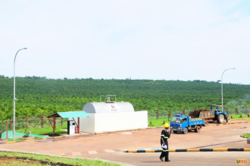The Observer | 1 August 2019
New report cites land grabbing in oil palm project
New report cites land grabbing in oil palm project
A new report by Makerere University's Human Rights and Peace Center (HURIPEC) has pinned the National Oil Palm Project for illegal land acquisition in Kalangala and Buvuma districts.
The report that was compiled between June 2018 and May 2019, exposes fraud in the purchase of land for the expansion of palm oil project in the two districts. The study analyzed land ownership and transactions related to the National Oil Palm Project in Kalangala and Buvuma. It included a detailed assessment of land ownership, mapping of land contracts, the conditions, compensation, and the application of free, prior and informed consent (FPIC) in decision making.
95 per cent of the 180 respondents were Bibanja holders while the remaining were licensees. The findings of the study are expected to feed into the proposed implementation of further land acquisitions in the new ten-year National Oil Palm Project (NOPP). The report also points to gross human rights violations by the Vegetable Oil Development Project (VOPD), land grabbing and irregular payments.
"This research found that Uganda Land Commission skipped processes in land acquisition and compensated squatters on public land without first taking the necessary steps. Regarding private mailo land, all rights of bibanja holders (bona fide occupants) and licensees must be recognized, but the Uganda Land Commission created leaseholds in favor of OPUL [Oil Palm Uganda Limited],” reads part of the report.
The study also shows that there wasn’t strict adherence to prior informed consent during land acquisition in Buvuma, while it was expected that the lessons learned from Kalangala should have informed better implementation in Buvuma. It also notes that differences in land tenure systems presented challenges in the successful and equitable application of the principles of free, prior and informed consent.
“Awareness raising prior to land acquisition was skewed towards potential benefits, and failed to transmit information in the right forums, formats and languages. Valuation and compensation processes leading to land acquisition were not clear, leading to high numbers of very disgruntled bibanja holders and licensees. Those involved in land sales had no access to legal representation, and therefore could not get legal advice to aid decision-making during the sale process,” the report further reads.
The report exonerates the Oil Palm Uganda Limited from accusations of growing palm oil fruits in forest reserves. This comes after the High court dismissed cases of encroachment against the oil palm growing company.
Ronald Kakungulu Mayambala, the lead researcher says the research was based on the public outcry by the project affected person after their failure to get justice.
However, Kyofa Kabuye, the project manager OPUL said that the research wasn’t based on facts since the researchers failed to liaise with the Agriculture ministry and Uganda Land Commission, which handled the land purchases.













